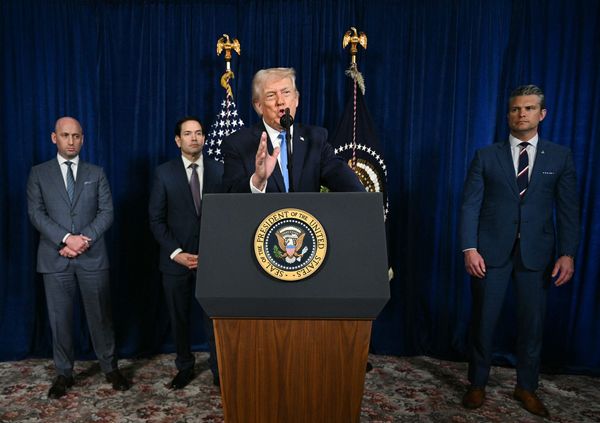
Australian states have vowed to press ahead with their own work to implement the Uluru statement from the heart’s three requests – voice, treaty and truth – despite the results of Saturday’s federal referendum.
Victoria, Queensland and South Australia have already begun implementing different parts of the statement, with the former the most advanced, having actioned all three elements.
The state already has a voice to parliament, via the democratically elected First People’s Assembly, as well as the Yoorrook Justice Commission overseeing the state’s truth-telling process.
Rueben Berg, the co-chair of Victoria’s First Peoples’ Assembly, said the state was on track to begin treaty negotiations at the start of 2024 after years of preparation.
“The Assembly has been around since 2019. We’ve had really significant substantial conversations about formal treaty processes for about seven years,” the Gunditjmara man told Guardian Australia.
“It’s a long journey and absolutely it’s going to take time, but the way we’ve set it up, people won’t have to wait until they’ve got everything organised to get treaty outcomes.”
South Australia’s attorney-general, Kyam Maher, told Guardian Australia a state-based voice was “absolutely going ahead”, despite a 65% no vote in the state.
The state legislated for a voice in March, then postponed the implementation while the federal referendum debate was under way. Elections will be held next March.
Maher said he’s had a “huge number of elders” contact him since Saturday to say the state voice is an opportunity for progress. He also met with the First Nations voice commissioner, Dale Agius, on Sunday.
“He and his team will start crisscrossing the state, giving information about the state voice, how to nominate and how to vote,” Maher said.
The SA Labor government is committed to implementing treaty and truth, but Maher said the voice will come first.
One Nation’s sole parliamentarian in SA, Sarah Game, has said she will introduce legislation to repeal the voice. But Maher said even if the Liberal opposition supports the repeal, it has “zero prospect” of passing.
Minns reaffirms election promise but ‘not going to rush’
NSW has the largest population of First Nations people in the country but is the only state not to have begun a treaty process or engaged in comprehensive land settlement deals. It voted 60-40 against the voice.
The state’s premier, Chris Minns, said the government was “going to have to go back and speak to First Nations leaders, but I’m not going to rush that”.
Minns reaffirmed on Monday an election promise to provid $5m for a year-long consultation on a treaty process.
“It’s important to note that a treaty in NSW would require a treaty with 150 different nations in this state, so it’s not a straightforward process,” he said. “It’s going to be complex and difficult.”
Minns would not be drawn on the next steps for NSW after the referendum, saying that “to do it in a unilateral way, 24 hours after a no vote across the country, is not the right way” forward.
Despite being open to a state voice, as revealed by the Guardian in September, Minns said “the majority of Australians didn’t support that change” and pointed out that there were “many different models that can show progress”.
He said that “to the extent possible, bipartisanship is really important” to make progress in NSW.
Queensland ‘not in a bad place’
The Queensland government has recommitted to its path to treaty, despite the state posting the highest proportion of no voters in the country at 69%.
The government in May passed legislation – with bipartisan support – establishing a pathway to treaty that will incorporate a three-year truth-telling inquiry.
The interim truth and treaty body’s co-chair, Mick Gooda, said the state’s process is entirely separate from the push for federal constitutional reform.
“We could be in a bit better position than some people because we’ve got treaty legislation, we’ve got a commitment from government to negotiate treaties and do truth-telling, we’ve got resources in the treaty fund to make that happen,” he said.
“So we’re not in a bad place following last weekend, we think we’ll just keep on going ahead with the path to treaty process.”
The nation’s most senior Liberal, Tasmanian premier Jeremy Rockliff, was a vocal supporter of the yes campaign, despite 59.5% of the state backing no.
In an interview with the Australian on Sunday, he dismissed suggestions his standing in the party or community had been damaged by his misreading the electorate on the issue.
He said he was forging ahead with plans for a truth-telling and treaty process. An Aboriginal advisory group has been set up by the government to guide the process and it held its first meeting in February.
Western Australia has not committed to a treaty process but its landmark south-west native title settlement is often cited as the nation’s first treaty.
Signed in 2015, it is the most comprehensive native title agreement negotiated in history – a $1.3bn settlement of Noongar people’s native title over 200,000 square kilometres of their traditional lands including Perth.
In 2018, the government announced plans to establish an Aboriginal representative body in the state.
The “Father of Reconciliation”, WA senator Pat Dodson, has urged the Cook government to press on with this work, as well as a state-based voice to parliament and truth truth-telling process.
In the Northern Territory, a treaty commission was abolished in December, with further consultation with Indigenous people to continue for two years. The decision to abolish the commission angered some Indigenous leaders.
In the ACT, treaty discussions are ongoing.
With Adeshola Ore and Eden Gillespie







